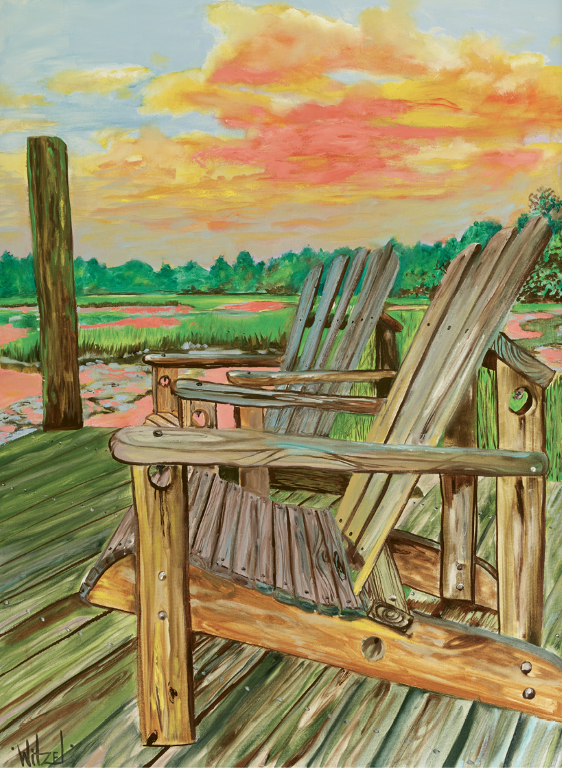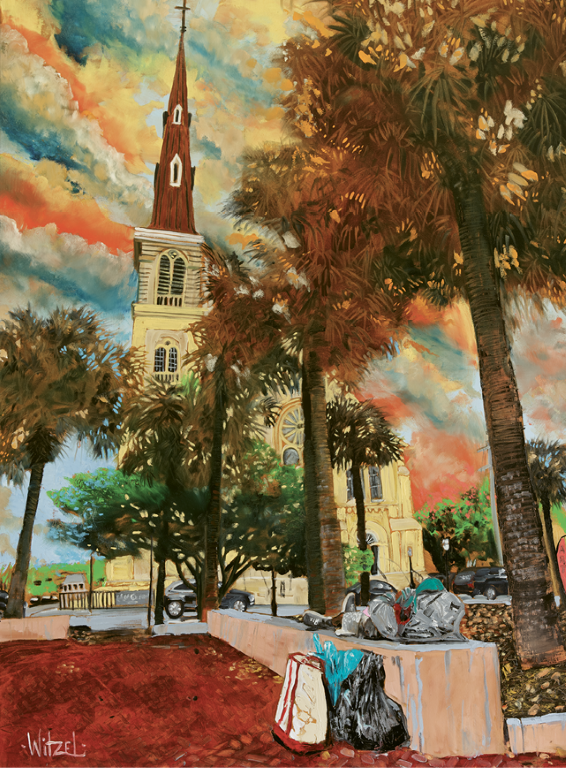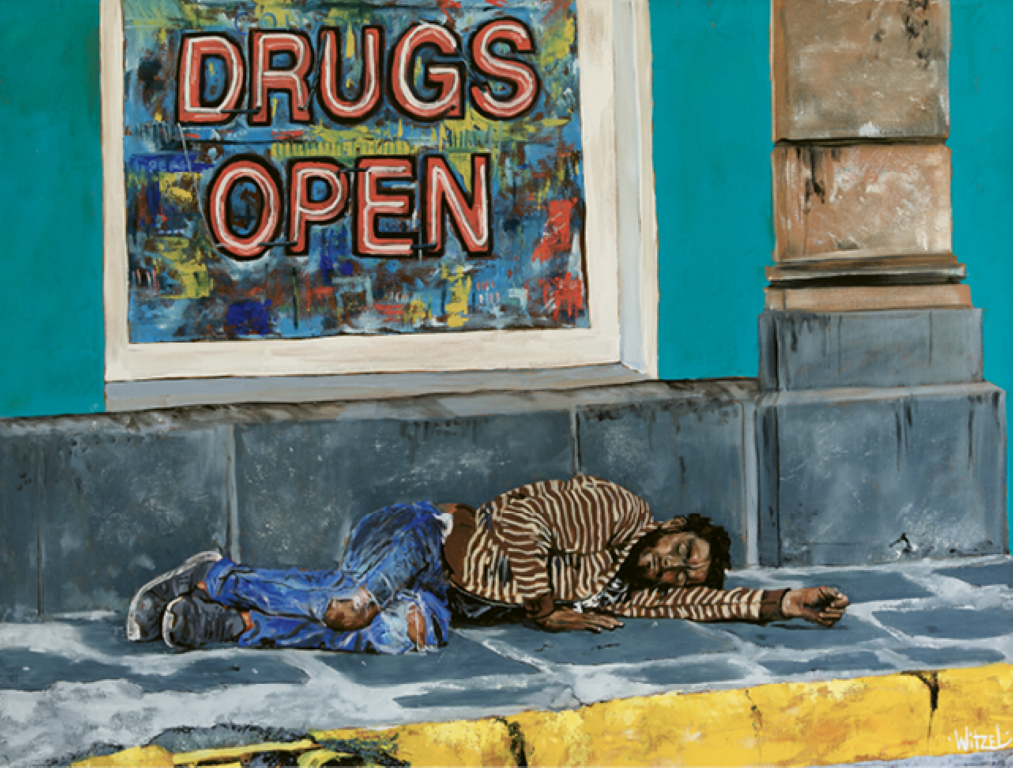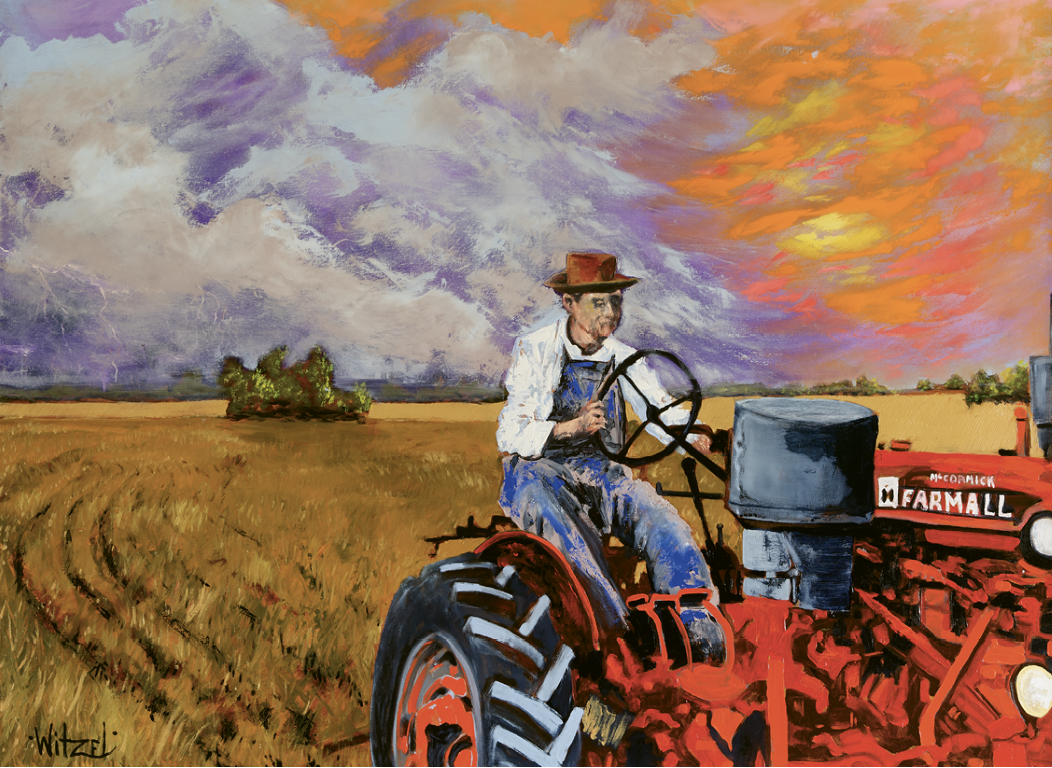
As a boy growing up in rural South Carolina, John Witzel learned to embrace beauty early, tromping through untouched natural landscapes, fishing pole in hand. His artwork today reflects that appreciation, with vividly colored representations of iconic Southern culture—serene waterways, a dockside sunset, the stoic palmetto, a catch of blue crab. Another side of the artist’s work reflects a more nuanced view, with oil paintings that present a memoir of sorts, capturing the dark elements as well as the light that are part of life as he sees it. It’s this dichotomy to which he strives to draw the viewer’s eye and awareness.
Witzel’s earliest paintings were gifts for a girlfriend—scenes painted on driftwood he found washed up on Pawleys Island beaches. A self-taught artist, his rustic pieces captured the town’s seaside vibe and started selling at a local coffee shop. But he says he didn’t think it was possible to actually earn a living as an artist.

“As a child, I always wanted to create art,” says the Hartsville native. “As I got older, teachers encouraged me, but I tucked it away. Growing up you learned you had to work hard for your money.”
Work ethic in hand, he joined a treasure hunting expedition in the Caribbean. For a year and a half, he shared quarters with a crew diving in search of a 16th-century shipwreck. While cruising the open waters, the boat sank off the coast of Martinique—he and the crew barely escaped with their lives.
“Surviving that near-death experience, more so than anything, was a life-altering event. It made me think, I’m going to do things differently. I have more to offer the world than this,” says Witzel, adding, “The artist’s life is hard too. We, as a society, should support the young talent coming up.”
That would not be his last life-altering event. Witzel embraced his passion for the artistic life, following his muse to the larger city of Georgetown, South Carolina. A fire broke out in the historic downtown in 2013, which destroyed nearly an entire block of Front Street—shops and businesses burned, including his apartment, studio and all his work. He rescued an elderly neighbor, getting out of the building moments before it collapsed; his dog, Jake, did not.
“Georgetown really took care of me after the fire,” he recalls. “They gave me clothing, food to eat. I thought it was important to give the city artwork—I wanted to give back to the city.”
Resisting the urge to relocate, Witzel instead became a part of the efforts to restore the district. With a borrowed easel and paints, he joined several other artists committed to documenting the aftermath of the disaster with a series of plein air paintings. It was a story of revitalization—covered by The New York Times. The institution later donated prints of the paintings to Witzel, which he handed out to town residents.

By 2016, well on his way to recovery, Witzel moved to Charleston. His artwork had been selected as the official event poster by the Pawleys Island Festival of Music and Art. Island Art Gallery in Pawleys Island invited him to show and sell his work; Studio 151 Fine Arts Gallery in Charleston’s French Quarter district followed suit.
“I showed at the Piccolo Spoleto Outdoor Art Exhibition this past June,” says Witzel. “It was a huge deal for me—I sold 13 original oil paintings over the two-week period.”
Witzel was also chosen, out of several hundred submissions, to display his work this year at ArtFields, an annual competition hosted by the Lake City ArtFields Collective, a community arts nonprofit with a mission that supports access to the arts for South Carolina youth and the underserved.
Witzel’s work continues to reflect the life events that have affected him deeply, like an iconic depiction of one of the Holy City’s historic churches against an intensely colored sky—while a homeless person sleeps in the shadow of the church. His message: Don’t be one of those people who dresses up to pray on Sunday while ignoring the needy.
“I know what it’s like to lose everything, to be without a home—they’re going through difficult times we know nothing about,” he explains. “I’d be hesitant to be a person who’s quick to judge. We should help them out.”

Witzel shows some of his newest work at his Johns Island studio by appointment. Also his home, he and his wife, Sarah, have set up shop on a rolling property overlooking the Stono River, where they tend a clutch of chickens, three dogs and a huge collection of old South Carolina dispensary bottles he dredges from local waters when not enjoying dockside sunsets.
Witzel remains passionate about the transformative power of art, and its ability to make a difference.
“I have an obligation to make my family and friends proud,” he says. “It’s a driving force. They have supported me, loved me. I want to give back, to bring about change.” *
Wendy Swat Snyder is a Charleston-based freelance writer (sweetgrassandgrits.com).

